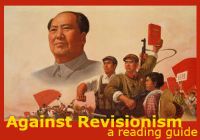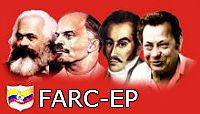 This is a collection of a series of reading notes as I work my way through Mao’s book, Five Essays on Philosophy. Some of this will expand upon material I’ve touched on in my article, Some Points on Stalin (and Mao). As I work through the book, I’ll add to this as time goes on. I’m doing this for two reasons: (1.) To help popularize and aid in the study of Marxism-Leninism in general and in the thought of Mao Zedong in particular, and (2.) to help sharpen my own thinking and raise my own theoretical level and understanding. I should add, finally, that in this and all of the other reading notes, this reflects a work in progress in my own study, and therefore, comments and Marxist criticism on the notes are encouraged.
This is a collection of a series of reading notes as I work my way through Mao’s book, Five Essays on Philosophy. Some of this will expand upon material I’ve touched on in my article, Some Points on Stalin (and Mao). As I work through the book, I’ll add to this as time goes on. I’m doing this for two reasons: (1.) To help popularize and aid in the study of Marxism-Leninism in general and in the thought of Mao Zedong in particular, and (2.) to help sharpen my own thinking and raise my own theoretical level and understanding. I should add, finally, that in this and all of the other reading notes, this reflects a work in progress in my own study, and therefore, comments and Marxist criticism on the notes are encouraged.
Five Essays on Philosophy
- On Practice (my notes)
- On Contradiction (my notes)
- On the Correct Handling of Contradictions Among the People (my notes forthcoming)
- Speech at the Chinese Communist Party’s National Conference on Propaganda Work (my notes forthcoming)
- Where do Correct Ideas Come From? (my notes forthcoming)

















Badass Blog!!! One of the best layouts and easy to use. Looks beautiful comrade!!
While originating from base, superstructure is divided into innumerable cubicles. It is not necessary that all cubicles in the superstructure are originated directly from base itself. Some cubicles are originated from other cubicles also. At times it may be hard to find out the origin of particular trend of a particular cubicle. As such, it is not correct to forcefully establish direct relation between base and one particular cubicles of superstructure.
As both opposing classes co-exist in the base; they co-exist in the super structure also.
Many observers think that language, music, science and maths do not have any class nature. Some observers even adds law and courts to this list.
I too agree that it is hard to find out the class nature of music at prima-facie. However, it is not an impossible task.
Music has many branches and every branch has numerous forms. And it is not difficult to divide music in to two major categories; first one that primarily intended to entertain relaxing class and the other one that primarily intended to encourage the working class.
As we find some benevolent kings and landless feudal lords in the economic front, there could certainly be some workers who love classic music and some upper crest people who lave folk music.
A.M. Khan Yazdani ( Danny)
khanyazdani@yahoo.co.in
Hi there! have you read Ira Gollobin’s book “Dialectical Materialism: Its Laws, Categories and Practice” (1986, Petras Publishing). I think it is a good exposition of dialectics. If you have read it please tell me what you think about it. thanks! see you around!
Yea, but to see what this guy was really about (including abusing his daughter and granddaughter), see http://www.iragollobin.com.
He though he was one of the three greatest men who ever lived (besides Christ and Marx) – fruitcake!